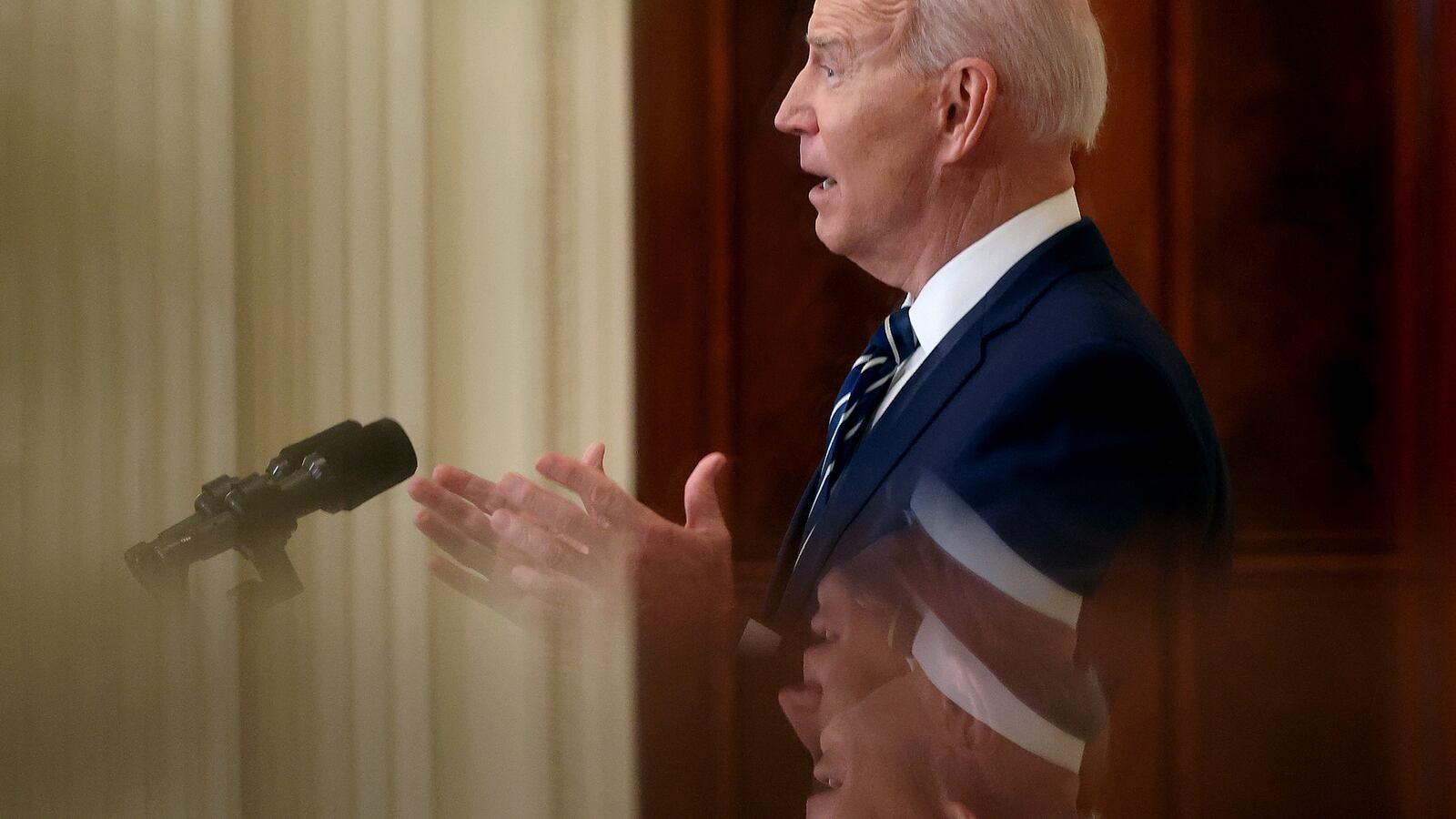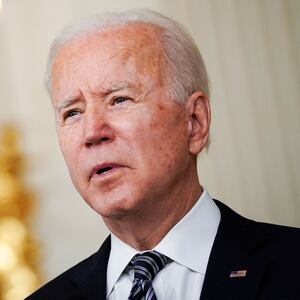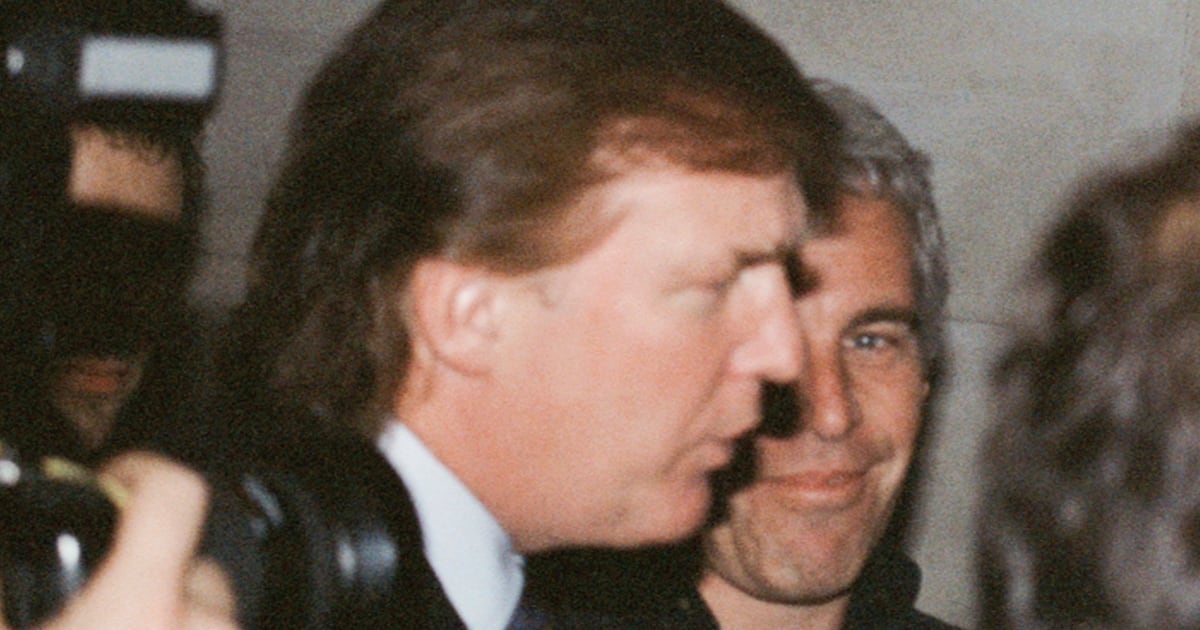In his first press conference as president, Joe Biden was asked several questions about the filibuster—and he answered with several of his own.
For more than an hour, Biden fielded questions on a sprawling range of issues. He talked about the elimination of the filibuster (not there yet), the flood of unaccompanied minors crossing the border (Trump’s fault, they’re working on it), the move to restrict voting rights in some Republican-led state legislatures (“it is sick”), whether he’ll run again in 2024 (that’s the plan), Afghanistan (the U.S. is leaving...at some point, maybe), the U.S. relationship with China (it’s complicated), gun violence (new restrictions are coming, eventually) and infrastructure spending (that plan is coming next week).
Many of his answers were long and winding versions of what he’s said in the past. Others were revealing.
He was asked several times about the conditions undocumented children face in U.S. facilities after they cross the border. One pointed question asked Biden if he thought the conditions were “acceptable.”
“That's a serious question, right? Is that acceptable to me? Come on,” Biden said, showing frustration. “That's why we're going to be moving 1,000 of those kids out quickly. That's why I got Fort Bliss opened up. That's why I've been working from the moment this started to happen to try to find additional access for children to be able to safely—not just children, but particularly children to be able to safely be housed, while we follow through on the rest of what's happening.”
As he finished his answer, he summed up conditions as “totally unacceptable.”
Minutes later, however, he stopped short of committing to a timeline for when media would be able to observe the conditions of children in custody. “I will commit, when my plan very shortly is underway to let you have access to not just them, but to other facilities as well,” he said.
Pressed on when that would be exactly, Biden said he didn’t know.
Reporters were similarly unable to pin Biden down on whether he would support the elimination of the filibuster, a Senate rule frequently used to block contentious legislation.
Biden has faced pressure to support eliminating the rule, which Democrats blame for stalling legislative progress on a number of priorities, including voting rights, gun safety, and comprehensive immigration reform.
While Biden expressed agreement with former President Barack Obama’s comments that the filibuster was a “relic of the Jim Crow era,” he said, it was “abused.”
“Successful electoral politics is the art of the possible. Let's figure out how we can get this done and move in the direction of significantly changing the abuse of even the filibuster rule,” he said. “First, it's been abused, from the time it came into be by an extreme way in the last 20 years. Let's deal with the abuse first.”
Biden was also evasive on what could be done to stop Republican legislatures from passing laws that curtail voting rights.
“It's sick, it is sick, deciding in some states that you cannot bring water to people standing in line waiting to vote, deciding that you're going to end voting at five o'clock when working people are just getting off work, deciding that there will be no absentee ballots under the most rigid circumstances,” he said. “This makes Jim Crow look like Jim Eagle, this is gigantic, what they're trying to do, and it cannot be sustained, and [I will] do everything in my power along with my friends in the House and the Senate to keep that from becoming the law.”
“Is there anything else you can do about it besides passing legislation?” the reporter asked.
“The answer is yes, but I'm not going to lay out a strategy in front of the whole world and you now,” Biden replied.
At the onset of the Biden administration, the White House was clear-eyed they would immediately face a host of problems: a pandemic that had killed nearly 500,000 Americans before he was sworn in, a mounting a massive scale vaccination campaign, and the need to pass a funding bill to get the American economy back on track through a thinly divided Congress.
The press conference started with a bit of good news on that front. The White House has already met their goal of 100 million shots in arms in Biden’s first 100 days, and Biden announced his administration was upping that goal to 200 million shots in 100 days.
But unpredictable events have hampered Biden’s progress several times. A mob’s siege of the U.S. Capitol on Jan. 6—provoked by then-President Donald Trump—led to his second impeachment conviction and subsequent acquittal just days after Biden took office, impeding the confirmation of his cabinet and slowing the passage of the stimulus bill.
A growing surge of unaccompanied minors at the southern border has also cost time and political energy, as the fledgling administration scrambles to house and process thousands of children fleeing their home nations. And just in the last two weeks, a pair of mass shootings—first in Georgia, and then in Colorado, that collectively left 18 people dead—has pushed gun safety to the forefront of the agenda once again, interrupting what was supposed to be a victory tour for Biden and Vice President Kamala Harris after the passage of their $1.9 trillion relief bill through the House and Senate.
Perhaps as a reflection of the hopelessness of the state of the debate over guns, the issue was only broached once in detail at the press conference.
And instead of pledging immediate action on gun control—Biden said his next priority was infrastructure—the president urged patience
“It’s a matter of timing,” he said, noting that he would have an “all of the above” strategy on gun control proposals. “Successful presidents, better than me, have been successful, in large part, because they know how to time what they are doing. Order it. Decide on priorities, on what needs to be done.”
In keeping with that principle, Biden said he hadn’t engaged with Republicans on immigration legislation yet. “They have to posture for a while,” Biden said. “They sort of got to get it out of their system.”







